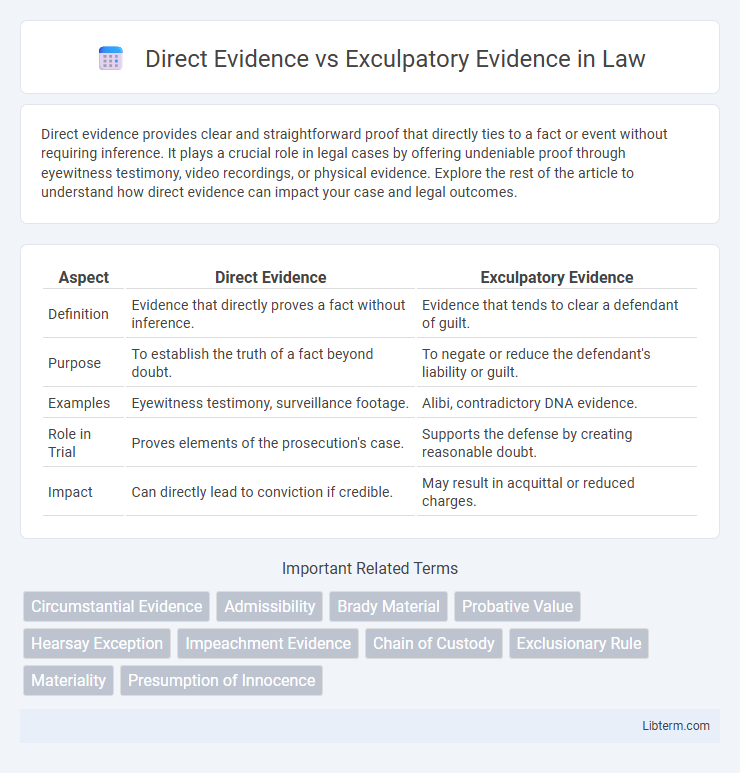Direct evidence provides clear and straightforward proof that directly ties to a fact or event without requiring inference. It plays a crucial role in legal cases by offering undeniable proof through eyewitness testimony, video recordings, or physical evidence. Explore the rest of the article to understand how direct evidence can impact your case and legal outcomes.
Table of Comparison
| Aspect | Direct Evidence | Exculpatory Evidence |
|---|---|---|
| Definition | Evidence that directly proves a fact without inference. | Evidence that tends to clear a defendant of guilt. |
| Purpose | To establish the truth of a fact beyond doubt. | To negate or reduce the defendant's liability or guilt. |
| Examples | Eyewitness testimony, surveillance footage. | Alibi, contradictory DNA evidence. |
| Role in Trial | Proves elements of the prosecution's case. | Supports the defense by creating reasonable doubt. |
| Impact | Can directly lead to conviction if credible. | May result in acquittal or reduced charges. |
Understanding Direct Evidence
Direct evidence includes eyewitness testimony, video footage, or physical objects that directly prove a fact without inference or presumption. This type of evidence establishes a clear link between the defendant and the crime, such as a security camera capturing the act or a witness identifying the suspect at the scene. Understanding direct evidence is crucial for building a strong, straightforward case that can reliably demonstrate guilt beyond a reasonable doubt.
Defining Exculpatory Evidence
Exculpatory evidence refers to any information or material that may prove a defendant's innocence or mitigate their culpability in a criminal case. Unlike direct evidence, which directly links a defendant to a crime, exculpatory evidence serves to refute or contradict incriminating evidence presented by the prosecution. The presence of exculpatory evidence is critical for ensuring a fair trial and can lead to the dismissal of charges or acquittal if it significantly undermines the prosecution's case.
Key Differences Between Direct and Exculpatory Evidence
Direct evidence establishes a fact conclusively, such as eyewitness testimony or video footage showing the event in question. Exculpatory evidence, on the other hand, tends to exclude or negate the defendant's guilt, offering a basis for acquittal or reduced charges. The key difference lies in direct evidence proving guilt, while exculpatory evidence supports innocence or raises reasonable doubt.
Role of Direct Evidence in Legal Proceedings
Direct evidence plays a crucial role in legal proceedings by providing explicit proof that directly supports a fact without the need for inference. Unlike exculpatory evidence, which aims to negate guilt or fault, direct evidence confirms an element of the case, such as eyewitness testimony describing the defendant's actions. This type of evidence often serves as the foundation for establishing the prosecution's or plaintiff's claims in court.
Importance of Exculpatory Evidence in Criminal Defense
Exculpatory evidence plays a critical role in criminal defense by providing proof that may exonerate the defendant or reduce their culpability, directly impacting the outcome of a trial. Unlike direct evidence, which supports the prosecution's case by establishing facts of guilt, exculpatory evidence introduces facts that negate guilt or undermine the prosecution's narrative. The disclosure of exculpatory evidence, as mandated by the Brady v. Maryland ruling, ensures a fair trial and upholds the integrity of the criminal justice system by preventing wrongful convictions.
Examples of Direct Evidence in Court Cases
Direct evidence in court cases includes eyewitness testimony where a person recounts seeing the crime occur, surveillance footage capturing the criminal act, and confessions made by the defendant admitting guilt. Another example is physical evidence such as fingerprints found at the crime scene linking the suspect directly to the offense. These forms of direct evidence provide straightforward proof of the facts in question without the need for inference.
Examples of Exculpatory Evidence in Legal Contexts
Exculpatory evidence includes witness alibis, video footage proving the defendant's absence from the crime scene, and forensic results such as DNA tests excluding the suspect's involvement. Police body camera footage that contradicts prosecution claims and credible eyewitness testimonies identifying another perpetrator also serve as powerful exculpatory evidence in trials. Such evidence plays a crucial role in preventing wrongful convictions and ensuring the defendant's right to a fair trial.
Legal Standards for Admissibility of Evidence
Direct evidence directly proves a fact without the need for inference, meeting legal standards for admissibility by being relevant, material, and more probative than prejudicial under rules like the Federal Rules of Evidence (FRE). Exculpatory evidence, which tends to exonerate the accused, must also comply with admissibility standards, including authenticity and reliability, and its suppression can violate due process under Brady v. Maryland. Courts evaluate both types of evidence for relevance, reliability, and potential prejudice to ensure a fair trial and accurate fact-finding.
Impact on Case Outcomes: Direct vs Exculpatory Evidence
Direct evidence establishes facts that directly prove a case element, significantly increasing the likelihood of conviction or judgment in favor of the prosecution or plaintiff. Exculpatory evidence introduces information that can absolve the defendant or cast reasonable doubt, often leading to reduced charges, dismissal, or acquittal. The presence and strength of either type of evidence critically shape trial strategies and influence jury decisions in determining case outcomes.
Protecting Defendant Rights: The Duty to Disclose Exculpatory Evidence
The duty to disclose exculpatory evidence is a fundamental aspect of protecting defendant rights, ensuring that any information favorable to the defendant that could exonerate or reduce their culpability is shared by the prosecution. Unlike direct evidence, which straightforwardly proves a fact in question, exculpatory evidence may provide alternative explanations or cast doubt on the prosecution's case, thereby upholding the principles of fair trial and due process. Failure to disclose such evidence violates the Brady rule, potentially leading to wrongful convictions and undermining the integrity of the justice system.
Direct Evidence Infographic

 libterm.com
libterm.com